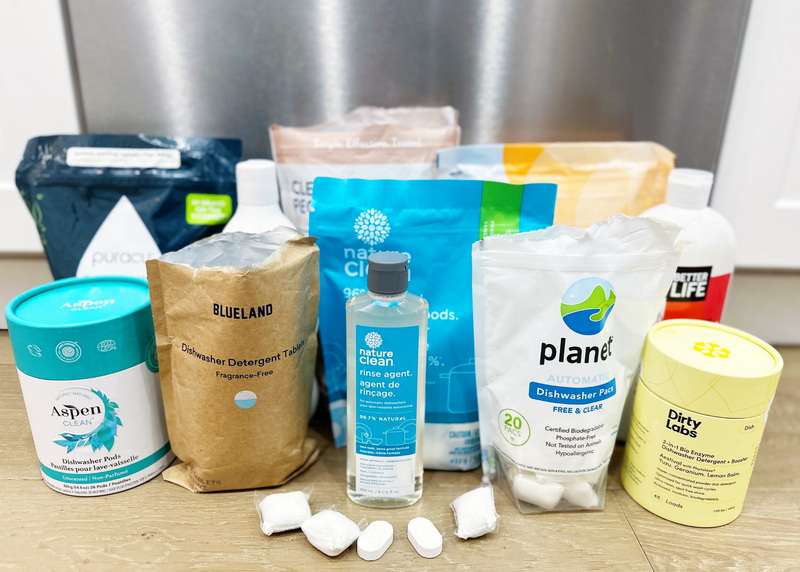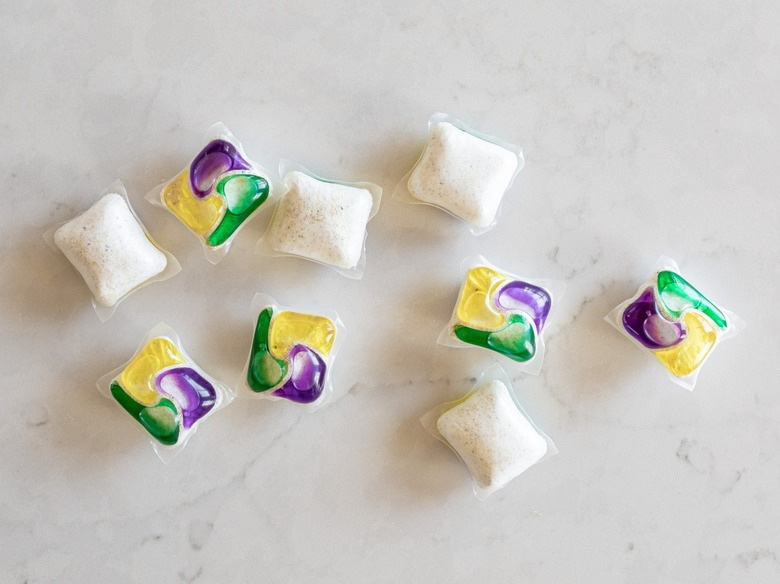Dongguan UFine Daily Chemical Co.,Ltd.
- All
- Product Name
- Product Keyword
- Product Model
- Product Summary
- Product Description
- Multi Field Search
Views: 222 Author: Tomorrow Publish Time: 10-15-2025 Origin: Site











Content Menu
● Why Choosing the Right Dishwasher Pods Matters for Baby Bottles
● Key Features of Safe Dishwasher Pods for Baby Bottles
● Common Ingredients to Avoid in Dishwasher Pods
● Recommended Types of Dishwasher Pods for Baby Bottles
● How to Safely Wash Baby Bottles in a Dishwasher
● Alternatives to Dishwasher Pods for Baby Bottles
● Potential Risks of Using Regular Dishwasher Pods
● How to Identify Safe Dishwasher Pods for Baby Bottles
● Storage and Handling Tips for Dishwasher Pods
● Additional Hygiene Tips for Baby Bottle Cleaning
● Benefits of Using Safe Dishwasher Pods for Baby Bottles
● FAQ
>> 1. Are all dishwasher pods safe for washing baby bottles?
>> 2. Can dishwasher pods damage baby bottle nipples?
>> 3. Is it necessary to pre-rinse baby bottles before using dishwasher pods?
>> 4. Can I use liquid detergent instead of pods for baby bottles?
>> 5. How important is it to choose fragrance-free dishwasher pods for baby bottles?
Ensuring the safety and cleanliness of baby bottles is a crucial concern for parents and caregivers. Baby bottles must be thoroughly cleaned to prevent harmful bacteria growth, and choosing the right cleaning agent plays a vital role in this process. Dishwasher pods are a popular choice for convenience and effectiveness, but not all pods are created equal, especially when it comes to baby items. This article explores what dishwasher pods are safe for baby bottles, how to choose them, and best practices for cleaning your baby's feeding equipment.

Baby bottles require careful cleaning because infants have developing immune systems that are vulnerable to bacteria and chemical residues. Using dishwasher pods that contain harsh chemicals, fragrances, or dyes can leave residues harmful to babies. Therefore, selecting pods formulated with gentle, non-toxic, and hypoallergenic ingredients is essential to protect your baby's health.
To determine which dishwasher pods are safe for baby bottles, consider these critical features:
- Fragrance-free and dye-free: These minimize the risk of allergic reactions and chemical exposure.
- Non-toxic ingredients: Ingredients should be safe if ingested in trace amounts, as small residue can remain after washing.
- Designed for sensitive items: Pods intended for baby bottles or delicate dishes often have gentler formulas.
- Effective on grease and milk residues: Baby bottles often have traces of fat and milk, so effective cleaning is still a priority.
- No harsh chemicals: Avoid pods with chlorine bleach, phosphates, or optical brighteners.
- Biodegradable and environmentally safe: Safer for your baby and for the environment.
Some dishwasher pods contain chemicals that are best avoided when washing baby bottles:
- Phosphates: Can irritate skin and mucous membranes.
- Chlorine Bleach: Harsh and potentially toxic residue.
- Artificial fragrances and dyes: May cause allergic reactions.
- Optical brighteners: Not food-safe and can leave harmful residues.
- Enzymes that are too harsh: Could damage plastic bottles or nipples.
Several brands manufacture dishwasher pods specifically designed with baby-safe formulas. Look for products labeled as:
- Hypoallergenic dishwasher pods
- Fragrance-free and dye-free dishwasher pods
- Pods approved for use with baby bottles
- Certified organic or natural dishwasher pods
Brands such as Seventh Generation, Ecover, and Babyganics are known for producing baby-safe dishwasher detergents. These pods focus on natural, gentle ingredients that do not compromise cleaning efficiency.
Even with safe dishwasher pods, proper washing techniques ensure your baby bottles are hygienic:
1. Pre-rinse: Rinse bottles and nipples by hand before loading to remove milk residues.
2. Use hot water settings: Hot water kills more bacteria and helps remove residues.
3. Place bottles upright: Arrange bottles and nipples to maximize water and detergent flow.
4. Choose gentle dishwasher pods: Use pods specifically designed for delicate or baby items.
5. Run the sanitary cycle if available: This cycle uses higher temperatures.
6. Air dry: Avoid towel drying which can transfer bacteria.
Thorough rinsing is important because residues from milk and formula can build up if not cleaned properly, providing a breeding ground for bacteria. While dishwasher pods have enzymes to break down such residues, pre-rinsing reduces the workload on detergent and ensures better hygiene.
If you prefer not to use dishwasher pods, consider these alternatives:
- Baby bottle-specific detergents: These are formulated for manual washing to be extra gentle.
- Dishwasher powders or liquids labeled safe for baby items: These products allow you to control the quantity and avoid harmful additives found in some pods.
- Sterilizing machines: UV or steam sterilizers offer an extra step of disinfection after washing, ensuring baby bottles are free of germs.
- Boiling bottles manually: Though time-consuming, this method is effective for sterilizing if detergent use is a concern.

Using regular dishwasher pods without considering their chemical content may lead to:
- Chemical residues on baby bottles that can be ingested by infants.
- Irritation to your baby's sensitive skin.
- Allergic reactions from fragrances or dyes.
- Damage to bottle materials, especially nipples made of silicone or latex.
- Environmental harm from non-biodegradable chemicals.
Residues from some pods can be particularly stubborn on plastics, making rinsing less effective. Babies have a tendency to mouth everything, so even small amounts of residue intake should be minimized.
To pick a safe pod, look for:
- Clear ingredient lists.
- Certifications such as EPA Safer Choice or USDA Organic.
- Positive reviews from parents.
- Absence of known harsh chemicals.
- Transparency from brands on safety for infant items.
Reading labels carefully is essential. Even "natural" sounding products can include additives unsuitable for babies, so verifying via trusted certification seals or third-party testing results highlights safer options.
- Store pods out of reach of children.
- Keep pods dry and sealed to maintain effectiveness.
- Use pods promptly after opening to avoid degradation.
- Do not handle pods with wet hands to prevent premature dissolving.
Proper storage maintains pod integrity and prevents accidental ingestion risks—both crucial in households with little children.
- Replace bottle nipples regularly, as bacteria can accumulate in small crevices.
- Periodically inspect bottles for cracks or discoloration to avoid bacterial buildup.
- Use a dedicated dishwasher basket or rack to keep bottles and nipples stable during washes.
- Consider running an occasional empty dishwasher cycle with vinegar to keep the machine clean and free of detergent buildup.
Keeping your dishwasher well-maintained prevents microbial growth that could contaminate baby bottles, enhancing overall cleanliness and safety.
- Peace of mind knowing your baby's bottles are cleaned without harmful chemicals.
- Reduced risk of allergic or skin reactions for your infant.
- Efficient removal of milk and formula residues.
- Less manual scrubbing and easier washing routines for busy parents.
- Environmental benefits when using biodegradable, non-toxic pods.
Parents can focus more on spending quality time with their child instead of worrying about cleaning hazards.
Choosing safe dishwasher pods for baby bottles is essential to protect your baby's health from harmful chemical residues and to ensure thorough cleaning. Look for pods labeled fragrance-free, dye-free, non-toxic, and designed for sensitive items. Follow proper washing techniques, such as pre-rinsing bottles and using hot water cycles, to maximize effectiveness. Brands that focus on natural ingredients and certifications can help simplify your choice. Always avoid harsh chemicals like chlorine bleach and optical brighteners. With the right products and care, you ensure your baby's feeding equipment is hygienically clean and safe.

No, not all dishwasher pods are safe. Only those free of harsh chemicals, fragrances, and dyes, specifically formulated for baby items or sensitive materials, should be used.
Yes, some pods contain enzymes or chemicals that can degrade silicone or latex nipples over time. Use pods designed for baby bottles or gentle formulations.
Yes, pre-rinsing removes milk and formula residues, helping dishwasher pods work more effectively and reducing residue buildup.
Yes, liquid detergents labeled safe for baby items are a good alternative to pods, offering control over ingredient levels and avoiding harsh substances.
Very important. Fragrances can cause allergic reactions or irritate a baby's delicate skin. Fragrance-free pods reduce this risk and enhance safety.